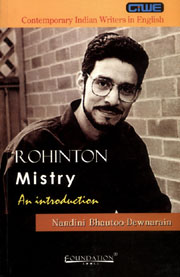Book contents
- Frontmatter
- Contents
- Series Editor's Preface
- 1 Introduction
- 2 The Local and the Universal
- 3 ‘Otherness’ in Mistry
- 4 Politics in Mistry's Fiction
- 5 Recurring Themes
- 6 Rohinton Mistry and Indian Writing in English
- Topics for Discussion
- Appendix A The 1975 Emergency
- Appendix B MISA
- Appendix C The History of the Bangladesh Conflict
- Appendix D List of Honours and Awards
- Bibliography
3 - ‘Otherness’ in Mistry
Published online by Cambridge University Press: 05 November 2011
- Frontmatter
- Contents
- Series Editor's Preface
- 1 Introduction
- 2 The Local and the Universal
- 3 ‘Otherness’ in Mistry
- 4 Politics in Mistry's Fiction
- 5 Recurring Themes
- 6 Rohinton Mistry and Indian Writing in English
- Topics for Discussion
- Appendix A The 1975 Emergency
- Appendix B MISA
- Appendix C The History of the Bangladesh Conflict
- Appendix D List of Honours and Awards
- Bibliography
Summary
The first chapter discussed Mistry's fictional imagination within the cultural space of the Parsi community as they struggle to make meaning of their existence within the politics and history of India. In a sense, the Parsis are twice ‘Othered’. They are a minority both in India and within the space of international literature.
Post-colonial discourse points to the way in which cultural/ethnic identities of the non-white cultures are often the ‘Other’ of the Empire. These ‘Others’ are the inhabitants of the ‘peripheries’, contrasted with the ‘self’ or European presence. Critics like JanMohammed, Bhabha and Said have argued that it is this ‘Other’, characterized as uncivilized, barbarous and sometimes mad, which was essential to the creation of the illusion of the ‘rational’, unified and sane European self. The dichotomy ‘Self’/‘Other’ raises issues of identity, alienation and difference, tied up with the problematic of the modes of apprehension of the cultural ‘Other’ of the West.
In this chapter I shall address the issue of ‘Otherness’ as it applies to the fiction of Rohinton Mistry, where it encompasses both form and theme. This is relevant because Mistry chooses to cast his narratives in the realist style.
Fiction and ‘Otherness’
The cultural world of the realist novel, according to Philippe Hamon, is a celebration of the stability of the bourgeois European self, represented by the main protagonist who is well integrated within his community.
- Type
- Chapter
- Information
- Rohinton MistryAn Introduction, pp. 40 - 63Publisher: Foundation BooksPrint publication year: 2006



